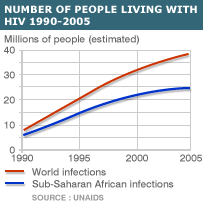 Tuesday, 30 May 2006
Tuesday, 30 May 2006Caribbean Aids fight 'is mixed'
By Simon Watts
BBC News
The Caribbean has achieved mixed results in fighting HIV/Aids, says the UN's annual report on Aids.
The region has the second highest rate of HIV infection, and the virus is the leading cause of death among young adults, hitting men and women equally.
The causes of the emergency are both cultural and economic, with Aids sometimes seen as a gay disease and using a condom regarded as not macho.
But the UN praises Haiti where projects have encouraged safer sexual practices.
Across the region, education programmes are under-funded, experts say, because governments prefer to spend their limited health budgets on the chronically sick.
Guyana epidemic
Along with the high cost of the drugs, tight budgets also explain this report's conclusion that the Caribbean is only providing a quarter of the anti-retroviral treatment needed.

So where are the success stories? The UN praises Haiti, which has the region's worst Aids problem.
The country's deep poverty and political instability have made it a priority for NGOs and drawn in an international peace mission.
UN officials say Haitians are now practising safer sex thanks to foreign-backed initiatives.
But this report contains alarming findings in parts of the Caribbean which are not on the international agenda.
It warns that in Trinidad and Tobago, teenage girls are six times more likely to be infected than their male counterparts.
The UN says this is partly for biological reasons.
And in Guyana, where information has previously been patchy, UN data now suggests a serious epidemic is underway.









